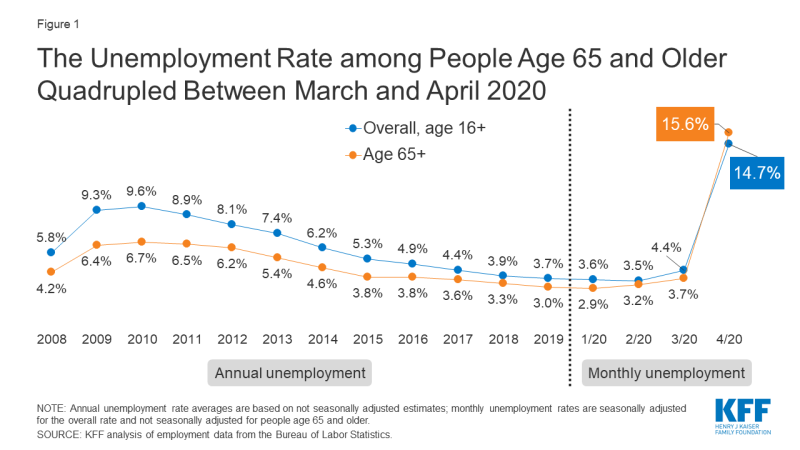Older Adults Are Hit Hard by COVID-19 – and Also Losing Jobs
Juliette Cubanski, Tricia Neuman, and Wyatt Koma
Published:
The scale of the economic crisis caused by the coronavirus pandemic just came into clearer view with the release of the latest unemployment numbers, which shows an overall unemployment rate of 14.7% in April, up from 4.4% in March – reflecting an increase of nearly 16 million in the number of unemployed Americans in the last month alone. The unemployment rate is the number of people who are out of a job but actively looking for work as a share of the overall labor force. These unprecedented job losses are being experienced by people across a wide array of occupations and in all age groups.
While the unemployment rate is now highest among people in the youngest age cohort – those ages 16 to 24, where the rate of unemployment is 27.4% – the next highest rate of unemployment is among the oldest age cohort – those ages 65 and older, where the unemployment rate is 15.6%. (Estimates presented here for people ages 55-64 and 65 and older are not seasonally adjusted, because the Bureau of Labor Statistics does not calculate seasonal adjustments for these age cohorts; estimates for younger age cohorts are seasonally adjusted.)
The unemployment rate among people age 65 and older quadrupled between March and April 2020 from 3.7% to 15.6% (Figure 1). By comparison, the overall unemployment rate tripled from 4.4% to 14.7%. From March to April, 1.2 million adults age 65 and older lost jobs, as did another 2.4 million people ages 55 to 64. Altogether, people 55 and older account for just under one fourth of all Americans who lost their jobs in April, which is proportional to their share of the workforce. More than 1 in 5 of the nearly 23 million Americans who are now unemployed are older adults (55+).

Figure 1: The Unemployment Rate among People Age 65 and Older Quadrupled Between March and April 2020
This surge in unemployment reverses years of steadily declining unemployment rates among adults of all ages. And in fact, more adults have continued to work into their older years over time, with labor force participation rates increasing more rapidly for those aged 55 and over, and particularly for those ages 65 and over, than for younger age cohorts. But now, with millions of older adults suffering job losses due to the economic downturn caused by the COVID-19 pandemic, they may be forced to dip into retirement savings or claim Social Security benefits before their full retirement age, resulting in lower payments permanently and undermining their future economic security.
Another major challenge is that people who lose their jobs often lose health insurance. Losing coverage in the midst of a pandemic is especially troublesome, particularly for those who may become seriously ill if they are infected with the coronavirus – which is more likely among older adults. Older adults ages 55-64 may be able to purchase COBRA from a former employer, purchase coverage in the marketplace, or enroll in Medicaid, depending on their individual circumstances. People ages 65 and older who lose employer-sponsored health insurance along with their jobs can enroll in Medicare if they had deferred enrollment while they continued to work, but this is not an option for younger adults.
Overall, these grim unemployment statistics reinforce the fact that the coronavirus pandemic is not just a major public health challenge, but also a threat to economic and retirement security for millions of older adults as well.
